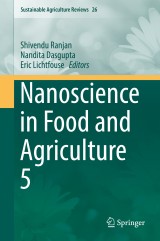Details

Nanoscience in Food and Agriculture 5
Sustainable Agriculture Reviews, Band 26
|
149,79 € |
|
| Verlag: | Springer |
| Format: | |
| Veröffentl.: | 12.07.2017 |
| ISBN/EAN: | 9783319584966 |
| Sprache: | englisch |
Dieses eBook enthält ein Wasserzeichen.
Beschreibungen
This book presents comprehensive reviews on the principles, design and applications of nanomaterials in the food and agriculture sectors. This book is the fifth of several volumes on Nanoscience in Food and Agriculture, published in the series Sustainable Agriculture Reviews.<p></p>
Chapter 01: Research trends and patents in nano-food and agriculture.- Chapter 02: Politics of nanotechnologies in food and agriculture.- Chapter 03: Nanosensors for Food and Agriculture.- Chapter 04: Nanoemulsions for nutrient delivery in food.- Chapter 05: Nanocarriers for resveratrol delivery.- Chapter 06: Milk proteins as nanoencapsulation materials in the food industry.- Chapter 07: Interactions of nanomaterials with plants.- Chapter 08: Nanomaterial impact, toxicity and regulation in agriculture, food and environement.- Chapter 09: Nanomaterial toxicity in microbes, plants and animals.- Chapter 10: Nanofertilizers for sustainable soil management.- Chapter 11; Impact of nanomaterials on the aquatic food chain.-Chapter 12: Nanoremediation for sustainable crop production.<p></p>
<div><p><b><i>Shivendu Ranjan</i></b><br/></p><p>Shivendu Ranjan is currently working as DBT-Research Fellow, Department of Biotechnology, Ministry of Science and Technology, Govt of India at VIT University, Vellore, Tamil Nadu, India. He is also serving for a non government organization as an Honorary-Director, Research Wing, Veer Kunwar Singh Memorial Trust, Chapra, Bihar, India. He is the Founder-Director at Xpert Arena Technological Services Pvt. Ltd., India (www.xpertarena.com); this company is dedicated to serve in online and offline sectors with a vision to simplify the education. He has also founded and drafted the concept for first edition of “<i>VIT Bio Summit</i>” in 2012 and the same has been continued till date by the university.<br/></p><p>His area of research is multidisciplinary which are as but not limited to: Nano-food technology, Nano-agri technology, Nanobiotechnology, Nano-toxicology, Natural products technology, Natural products chemistry, Bio-business, Food chemistry and Food Engineering. He has published many scientific articles in international peer reviewed journals and also serving as editorial board member and referee for reputed international peer reviewed journals. He has bagged several awards from different organizations e.g. Best poster award, achiever award, research award, young researcher award <i>etc</i>.<br/></p></div><div><br/></div><div><div><b><i>Nandita Dasgupta</i></b></div><div>Nandita Dasgupta is currently serving as Research Associate at VIT University, Vellore, Tamil Nadu, India. She has exposure of research institutes and industries including CSIR-Central Food Technological Research Institute, Mysore, India and Uttar Pradesh Drugs and Pharmaceutical Co. Ltd., Lucknow, India. Her areas of interest include toxicological analysis, natural products technology, nanobiotechnology and agri-food technology.<br/></div><div><br/></div><div>She has published many scientific articles in international peer reviewed journals and also serving as editorial board member and referee for reputed international peer reviewed journals. She has received Elsevier Certificate for “Outstanding Contribution” in Reviewing from Elsevier, The Netherlands. She has also been nominated for Elsevier advisory panel for Elsevier, The Netherlands. She was the Guest Editor in Journal of Chemistry for the special issue entitled “Food Nanotechnology Opportunities and Challenges”. She has received several awards from different organizations e.g. Best poster award, young researcher award, Special achiever award, research award, <i>etc</i>.</div></div><div><br/></div><div><i><b>Eric Lichtfouse</b></i><br/></div><div><div>Eric Lichtfouse, is a soil scientist at the French National Institute for Agricultural Research (INRA). He has invented the 13C-dating method allowing to measure the dynamics of soil organic molecules, thus opening the field of molecular-level investigations of soil carbon sequestration. Chief Editor of the awardedjournal Agronomy for Sustainable Development, he has raised the journal rank from 29/53 in 2003, with an impact factor of 0.56, to 2/81 in 2014, with an impact factor of 3.99, in the Agronomy category. He is also Chief Editor and founder of the journal Environmental Chemistry Letters and the book series Sustainable Agriculture Reviews. He is lecturing scientific writing and communication in universities worldwide. His publication assistance service at the INRA has founded the french-english newsletter Publier La Science. He has published the book Scientific Writing for Impact Factor Journal. This textbook describes in particular the micro-article, a new tool to identify the novelty of experimental results. Further details are available on Slideshare, LinkedIn, ResearchGate, ResearcherID and Orcid.</div></div>
<p>This book presents comprehensive reviews on the principles, design and applications of nanomaterials in the food and agriculture sectors. This book is the fifth of several volumes on Nanoscience in Food and Agriculture, published in the series Sustainable Agriculture Reviews.</p> <p>Nanotechnology, the use of techniques to create nanomaterials, is a rapidly emerging scientific field. Yet nanomaterials are nothing new; they have always occurred in nature. What is new: the methods that allow us to synthesize unprecedented nanomaterials with precisely tailored properties, thus opening the door for many applications in diverse fields.</p> <p>In particular, the high surface to volume ratio of engineered nanomaterials makes them often more efficient than their natural equivalents. Surprisingly, some nanomaterials even exhibit contrasting properties compared to their macro counterparts. While nanomaterials have been widely commercialized in various sectors, their use in food industries is still slowly emerging and hotly debated.</p> Findings show that nanomaterials can improve bioavailability and shelf life. Further, by reducing nutrient loss, they are essential to active packaging: packaging systems that help to extend shelf life, monitor freshness, display information on quality, and improve safety and convenience. Nevertheless, the potential toxicity of new nanomaterials should be studied before their use in consumer products.<br/><p></p><p></p>
Reviews on nanomaterials for food and agriculture Reviews on patents and policies Toxicity of nanomaterials for plants and the food chain
Diese Produkte könnten Sie auch interessieren:

Agricultural Biodiversity and Biotechnology in Economic Development

von: Joseph Cooper, Leslie Lipper, David Zilberman

213,99 €

Policy Reforms and Agriculture Development in Central Asia

von: Sandjar Djalalov, Suresh Chandra Babu

213,99 €

Regulating Agricultural Biotechnology

von: Richard E. Just, Julian M. Alston, David Zilberman

213,99 €













